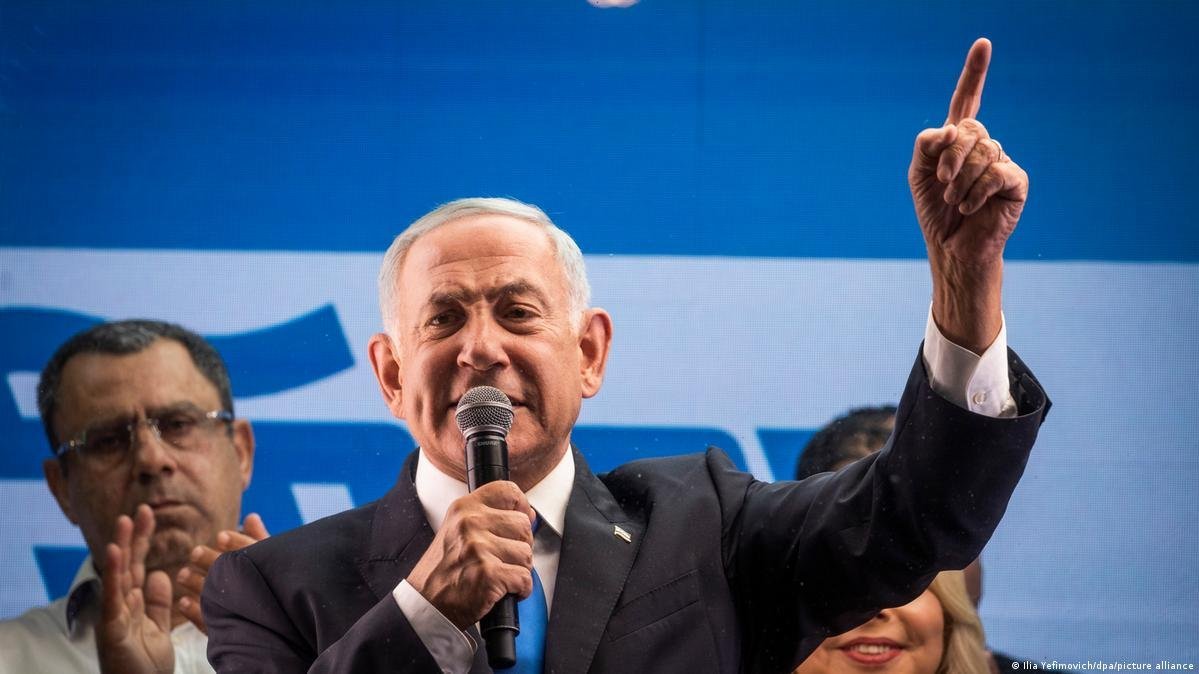Benyamin Netanyahu gives an election victory speech (Uncredited, AFP).
Likud party leader Benyamin “Bibi” Netanyahu met with religious and secular party allies in Jerusalem on Sunday to begin early talks of forming a government after a major upset in Israel’s 25th parliamentary elections. Likud and its conservative bloc won a clear majority of 64 seats in the 120-seat Knesset last Tuesday, the fifth parliamentary election in Israel in less than 4 years. With 97% of ballots counted by Thursday evening, reigning prime minister Yair Lapid called his opponent Netanyahu to congratulate him and concede the race, which had the highest turnout of any Israeli Knesset election for almost 25 years at 71% of eligible voters. Lapid’s centrist Yesh Atid party combined with Benny Ganz’s center-left “Blue and White - New Hope” alliance to retain 46 seats. The Israeli-Arab Ra’am coalition and the Marxist/Arab-nationalist bloc Hadash-Ta’al split the remaining 10 seats. The results are expected to be certified on November 9th, after which Israeli President Yitzhak Herzog will invite Netanyahu to form a government. However, “unofficial” cabinet talks have already begun, as Netanyahu reportedly wants to announce the formation of a government for installation no later than November 15.
Netanyahu’s victory was fueled by the ascendency of a secular right-wing Zionist party Otzma Yehudit (literally “Jewish Strength”), led by charismatic and controversial attorney Itamar Ben-Gvir, who favors deporting Arab citizens of Israel who show “disloyalty,” and favors the revocation of Palestinian autonomy in the West Bank. Known for his contentious speeches and public antics, Ben-Gvir has become a lightning rod both within Israel and internationally, with the administration of US President Biden signaling that they will work with Netanhayu, but not the Otzma Yahudit leader. Regardless, Ben-Gvir’s party is the third largest in the new parliament. The Orthodox Shas, and United Torah Judaism parties added a combined 18 seats to Netanyahu’s victory as well. The super-majority ensures that Bibi can form a conservative government without sharing power with Lapid, Ganz or Avigdor Lieberman, a former Bibi ally in the center right Yisrael Beiteinu (“Israel Our Home”) party, who has recently acted as a wild card in Israel politics. Lieberman has turned against his former mentor in recent years, offering to work with Netanyahu’s Likud party if Bibi were to retire.
Last week’s election could have far-reaching consequences for the Middle East peace process, as Bibi was one of the primary architects of the 2020-21 Abraham Accords which saw four Arab nations announce their intention to establish diplomatic, economic and military relations with the Jewish State. Bibi has stated his intention to accomplish the “big prize” of the accords - full normalization with the Kingdom of Saudi Arabia. Israel and the Saudi Kingdom have worked together unofficially for years, especially in coordination against their mutual enemy, the Islamic Republic of Iran. Although King Salman has promised that there will be no Israeli-Saudi peace deal until the Israeli-Palestinian conflict has been resolved, his son and heir-apparent, Muhammad bin Salman (MBS), has signaled a much more progressive and pragmatic approach to Israeli-Arab relations. MBS was recently appointed as the Prime Minister of the Saudi Parliament, a position reserved for the king, confirming that he is gradually taking the reins of power from his ailing, 87-year-old father.
In addition to an Israeli-Saudi peace deal, Bibi has also stated that he “intends to bring the Arab-Israeli conflict to a close,” suggesting that a peace deal with the Gulf Kingdom may include settlement of the Palestinian issue as well. In light of the ongoing gridlock between Israel and the Palestinian Authority, as well as the alarming rise of jihadist groups in the West Bank, alternate routes of Mideast peace have gained traction in Israeli and Arab circles of leadership. One such framework, known as the “Saudi Plan,” would give Saudi Arabia religious stewardship of the Temple Mount, and would create a “Hashemite Kingdom of Palestine” with its capital in Amman, Jordan. This arrangement would effectively annex the West Bank back into Jordan politically while allowing Israel to maintain a defensive presence along the Jordan Valley, bypassing the Palestinian leadership and scrapping the long-sought but elusive two-state solution outlined in the 1993 Oslo Accords. It is not clear if the Saudi, Jordanian, or other Arab governments would be receptive to such a deal.
Netanyahu’s return to power may also have ramifications for the recent deal with Lebanon to establish a maritime border, ceding valuable offshore gas fields to Lebanon in order to assuage Hezbollah and other jihadist groups inside Lebanon, which is reeling under ongoing political and economic turmoil. Bibi is also likely to increase pressure on the US and EU governments to scuttle the Iranian nuclear talks, which are currently on ice while the Iranian regime continues its violent repression of a growing street protest movement inside its borders.
We would ask the Maranatha global family to join us in prayer for the people of Israel and the Israeli government during this precarious time. We pray for divine wisdom to be granted to the new Israeli government, as well as its neighboring Arab states. We pray for the schemes and designs of the enemy to be restrained, and for the Good News of the Prince of Peace to spread across a region of conflict and upheaval.
Maranatha.
Sources:
Netanyahu set to return to power in Israel after PM concedes | AP News
Israel election 2022: Yair Lapid congratulates Benjamin Netanyahu on victory | CNN
Netanyahu to Return to Power in Israel as Lapid Concedes Defeat - The New York Times (nytimes.com)
Election result marks dangerous new turn in Israel’s rightward shift | Israel | The Guardian
Netanyahu to JNS: I intend to achieve peace with Saudi Arabia - JNS.org
Israel Elections 2022 - All The News And Latest Stories - I24NEWS
Watch Now: Live Updates And Broadcast Of Israel's 2022 Election - I24NEWS
U.S. unlikely to work with Jewish supremacist expected to be made Israeli minister (axios.com)




